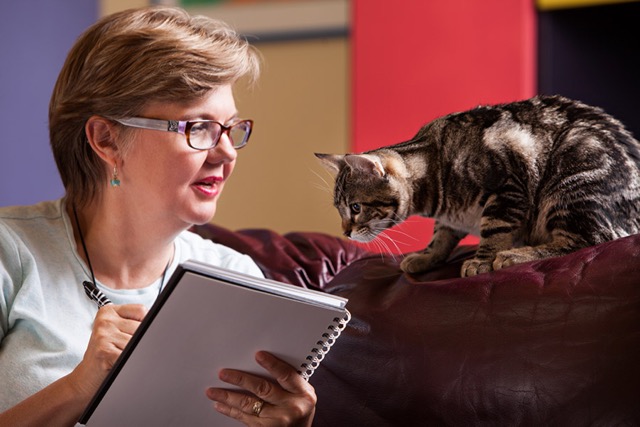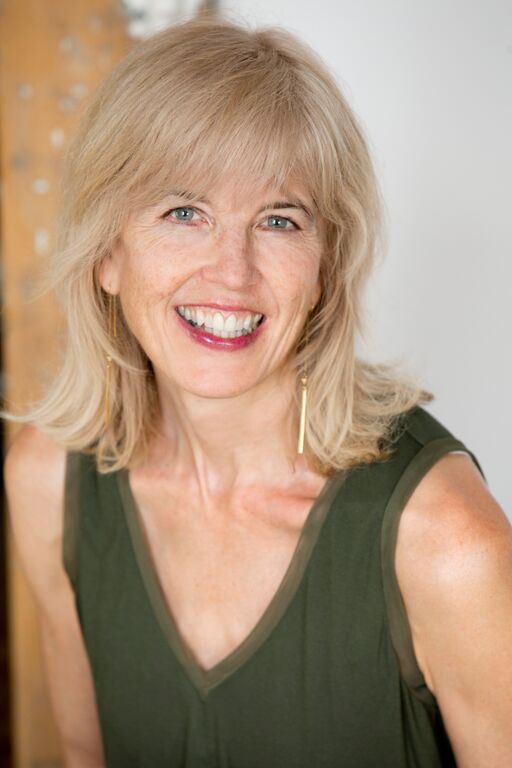Kathi Appelt and Alison McGhee are longtime friends and co-authors of the middle-grade novel, “Maybe a Fox.” The following is a complete transcript of their interviews with Cracking the Cover.

Questions for Kathi Appelt:
Where did the idea for “Maybe a Fox” come from?
For several years Alison has maintained a listserv in which she sends out “Poem of the Week.” She chooses a poem and emails it to the folks who are on her list. She also posts it on her blog. One week she sent along the poem that we used as an epigraph and I sent her a quick note telling her how much I loved that poem. She responded by saying something along the lines of “doesn’t it seem like there’s a story there?” Yes, I thought, there is a story there. Next thing we knew, the story began to take shape.
Did you always plan on writing “Maybe a Fox” with Alison?
Plan? I never really intended to co-write a story, but Alison and I were so copacetic when it came to our views of the world and our notions of story that within the first week of our friendship we both agreed—maybe a co-authored story would be fun. So much fun!
Take me through the process of co-authoring.
Initially, we each chose a character—Alison chose the fox and I chose Jules—from whose point of view we would write. We would take turns with our chapters, tossing them back and forth to each other and eventually the story lines began to emerge. Once we had a full draft, we spent a long summer weekend together trying to hammer out the details of the plot and the structure of it. After that, it was a lot of revising. And I said “a lot,” I mean it was years of revising. Of course, both of us were working on other projects too, but this story took its own sweet time. For a long time, what we really had were two stories that moved side-by-side, and it just took awhile to convince those two stories to overlap so that they made a single story.
How did the individual characters of Jules and Senna develop?
Jules and Senna. I think that Alison had a very good grasp on small Senna from the get-go, but it took both of us a while to really figure out who Jules was. Initially, she was the older sister and Sylvie was the younger, so the original Jules carried a lot of guilt around for not protecting her younger sister. But at some point, we decided that the guilt was getting in the way of the bigger story themes—hope, resilience, wishing—and we decided to switch those roles. But that also meant re-imagining what was motivating Jules. If not guilt, then what? That’s when we gave her the unanswered question that Sylvie left behind.
“Maybe a Fox” is not what I would call a happy book, but it is filled with hope. Why is this sort of novel important for young readers, particularly middle grade?
I think that stories of hope are important for all readers, actually. But those middle graders are so very vulnerable, and I think they’re also underestimated for what they are capable of. So many kids are carrying heavy burdens, but they are also resilient. We wanted to provide our readers with characters whose hearts are as big as theirs.
What are you working on now?
have several projects in the works, but none of them are far enough along to talk about.
Any plans to work with Alison again?
I am always open to working with Alison again. She’s my dream partner.

Questions for Alison McGhee:
Where did the idea for “Maybe a Fox” come from? Did you always plan on writing “Maybe a Fox” with Kathi?
Kathi and I met at Vermont College of Fine Arts twelve years ago. It was a frigid January night in a dismal dorm, and my luggage had gotten lost. She offered to lend me some pajamas and a blanket, which endeared her to me instantly. (And also made me laugh, since I’m about twice as tall as she is—we are physical opposites.) Next morning we ate breakfast together at a small table in the cafeteria, a two-seater between two tall pillars. We kept on eating every meal together at that table for years. But that very first week, Kathi suggested we write an epistolary book together: two sisters writing back and forth. (At least, that’s how I remember it.) So right from the start of our friendship, the idea of a book about two sisters was born. Many years later, I sent out a poem on my poem of the week blog. The poem, which Kathi and I both loved, had a small fox in it, a fox that we were entranced by. So we decided then and there to begin our book, and that it would have a) two sisters, somehow separated, and b) a fox.
Take me through the process of co-authoring. How did the individual characters of Jules and Senna develop?
At first we traded chapters weekly. I was the fox and Kathi was Jules. They were entirely separate voices, and they stayed that way for the first couple of years. At some point, we realized that the story had to be one, aligned voice, so we gave up writing separately and took turns plunging in and revising the book as a whole. That process was not entirely easy, because we both have such respect for each other’s voice and style as a writer. Chopping and re-writing the work of someone whose writing you love, as if it’s your own work, was an interesting and initially formidable task.
“Maybe a Fox” is not what I would call a happy book, but it is filled with hope. Why is this sort of novel important for young readers, particularly middle grade?
Maybe a Fox is a book about heartbreak and loss, but more than that it is about resilience, how we as human beings suffer unimaginable grief and emerge, if not stronger, then deeper. Jules has been through a lot in her young life, and so has her father and her best friend. The forest and wild land that surrounds their home is almost a character in and of itself, full of ritual and comfort and a kind of magic. Hope is essential in literature, I think, no matter the age, because it’s essential in life. I always have thought that hope is harder than despair—you have to talk yourself into it sometimes—but you can’t go on for long without it.
What are you working on now?
Right now I’m finishing the revision of a new novel for adults. After that, I have another middle-grade novel to revise, and after that, I have a young adult novel to revise. It’s novels novels novels around here. Good thing I love working on them, right?
Any plans to work with Kathi again?
Work with my sister K again? I sure would. I love that girl.
